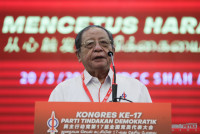THE advancement of communication technology has opened up new possibilities for organisations to adopt anytime, anywhere, and anyhow work arrangements.
Post-pandemic, organisations are increasingly comfortable with the idea of having unlimited access to their employees online.
Work discussions on instant messaging applications such as WhatsApp and Telegram have become a common and acceptable practice.
It has become the new norm for people to be expected to address work-related matters well after office hours or even while on official leave, including weekends.
While this can be seen as a gain for business, studies by International Labour Organisation (ILO) and Pew Research Centre have shown that in the long run, this can be detrimental to the productivity of the organisation.
The diminishing demarcation of official working hours due to the pervasiveness of information and communication technology (ICT) has led to people having to work longer hours.
Workers robbed of family time
The pressure to be available for work-related matters can be unsettling, especially when one’s worthiness at work tends to be judged by how responsive they are in responding to work matters via instant messaging.
People feel compelled to check work messages every time they hear the notification sound on their mobile phones.
This can lead to employees experiencing work-family conflict, which is also known as work-life conflict. This conflict can lead to anxiety, a sense of low achievement, and in the long run, depression, resulting in mental health problems among employees.
Unlike in the pre-pandemic era, when people had some level of boundaries between work and home, the post-pandemic era has created avenues for unlimited access to employees, and this has become an unhealthy norm that is increasingly being practised by organisations.
Employees are robbed of their time with their families and find themselves working longer hours.
While it is good that organisations are practising outcome-based work arrangements that promote more flexibility in working hours, this should not be seen as a ticket to cross over the boundaries of personal and family time.
Clear boundaries of working hours
The ILO has suggested that any type of flexible working arrangement needs to be regulated to contain the potential detrimental effects.
This can be done through awareness and policies that allow for the “right to disconnect” from work.
Clear boundaries for core working hours can be introduced, where at a given time, employees are expected to be accessible online as well as offline.
For example, from 9am to 12pm and from 2pm to 4pm, meetings, messaging, and any work-related activities are expected to be performed.
A culture of healthy work-life balance can be inculcated by educating the organisation on the etiquette of communicating outside of office hours and measuring the urgency of the messages that are sent.
Just because one person feels like being productive at work over the weekend does not mean that everyone else has to follow suit.
The messages sent, even if they are intended as a heads up for the upcoming work week, can weigh heavily on the reader’s shoulders for the entire weekend, stealing away moments of peace to recover from a long week of work.
The time has come for HR departments to update their policies to address and balance the need for communication beyond office hours with the importance of recognising employees’ personal time. – The Vibes, October 7, 2023
Rohaini Ramli is a senior lecturer at the Department of Informatics, College of Computing and Informatics, Universiti Tenaga Nasional



















